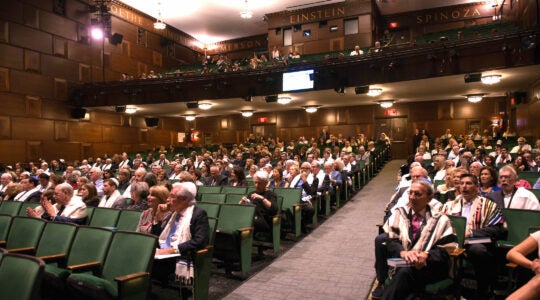While Arthur Miller’s searing dramas typically revolve around issues of moral responsibility, few contain explicitly Jewish characters; for example, it took half a century after the premiere of “Death of a Salesman” for Miller to admit that he conceived of the Lomans as Jews. But in Miller’s 1968 play, “The Price,” a revival of which opens this week at the Roundabout Theatre Company on Broadway, a colorful Jewish character predominates.
“The Price,” which is directed by Steppenwolf veteran Terry Kinney, centers on two estranged brothers, Victor (Mark Ruffalo, “Awake and Sing!”) and Walter (Tony Shalhoub, fresh from “The Band’s Visit”). The siblings reunite after a 16-year separation because their long-deceased father’s Manhattan brownstone is slated for demolition and they are obliged to dispose of the family’s antique furniture. First, however, they need to deal with an elderly Jewish appraiser, Gregory Solomon (Danny DeVito, making his Broadway debut), who becomes both a stand-in for the absent father and a caretaker of the brothers’ shared past. How each brother interprets that past determines how he ultimately must reckon with the possibility that he has betrayed his own deepest values, even as he feels terribly let down by a once-revered father who turned into a shadow of his former self.
While “The Price” never mentions the Vietnam War, the play premiered when the nation was struggling with the possibility of having sacrificed its own moral principles on the altar of anti-Communism. That struggle may well resonate in the current political climate, as many Americans feel that the nation’s new leaders have lost touch with our most deeply cherished ideals. Indeed, coming less than a week after Purim, Miller’s play may speak more pointedly than any Purim shpiel about the need to hold onto one’s moral compass in a world that is turning upside down.
Miller was born in 1915; his father, Isidore, was a Polish Jewish immigrant who became a successful coat manufacturer and was able to move his family out of the Lower East Side and give it an upper-middle-class lifestyle. Yet he was wiped out in the stock market crash of 1929, just like the father in “The Price,” whose sense of self is destroyed, leading him to depend on Victor for support. Victor renounces his ambition to become a scientist, going into the police force instead, while Walter essentially abandons both of them on his way to becoming a successful, if emotionally fragile, physician.
What complicates the situation is that the father, despite warping Victor’s life by inducing him to give up his dreams, may not have been quite as destitute as he seemed. In the end, all of these self-deluded characters, including Victor’s alcoholic wife, Esther (Jessica Hecht, who played Yente in the recent revival of “Fiddler on the Roof”), must struggle, as so many of Miller’s characters do, to escape the self-loathing that threatens to engulf them. The heavy antique furniture, which Solomon insists cannot be sold because it will not fit through the doors of a modern apartment, represents the Old World and immigrant past that both brothers (although they are not explicitly marked as Jews) are ultimately powerless to transcend.
Betrayal runs deep in “The Price.” Some critics have read the play as fundamentally about the playwright’s turning his back on his own Jewish identity. Miller recalled in his 1987 memoir, “Timebends,” that even as a 6-year old child, he found himself ashamed, when asked by a librarian who his father was, to utter his father’s obviously Jewish name. Nevertheless, as critic Janet Balakian has noted, “Miller’s Old Testament sensibility always drove him back to the mythical Fall in Genesis, for which the Depression, the Holocaust and McCarthyism became his 20th-century correlatives.” The playwright, she added, “felt compelled to explore his characters’ connection with his past and thereby his union with a larger destiny.”
The challenge that any modern production of “The Price” has is to avoid seeming as dated and musty as the very furniture over which the brothers are battling.
The original production received decidedly mixed reviews; the critic for Time derided it as a “museum piece” while Clive Barnes of The New York Times called it “dubiously motivated and contrived,” with the brothers’ conflict “too rigged, too pat.” Even so, audiences liked it, and the show ran for 429 performances. The play has already been revived three times on Broadway, most recently in 2000, in a production starring Bob Dishy as Solomon. (An audio recording of an L.A. Theatre Works production, recorded in London in 1989, featuring Richard Dreyfuss and Harris Yulin as the two brothers, is available for free download from the Web.)
Miller’s play grew from his reaction to what America was doing in Vietnam, which he was convinced would make just as negative and long lasting AN impact as the Great Depression. “If the war would cost me nothing materially,” he wrote in 1998, “it wore away at the confidence that in the end Reason would return lest all be lost.” The play, he explained, “grew out of a need to reconfirm the power of the past, the seedbed of current reality, and the way to possibly reconfirm cause and effect in an insane world.” If “The Price” is to speak to the audience of today, it will be precisely because our world seems to be going crazy as well, imperiling the very possibility of moral accountability.
That Miller was able to write so compellingly about such themes cannot be explained without reference to his Jewish roots. Although he told an interviewer in 1984 that he was “never really a religious person in any conventional sense,” he conceded that much of his worldview stemmed from the Bible. “The more I live, the more I think that somewhere down the line it was poured into my ear, and I don’t even know when or how. But I’m reading it again now, and I’m amazed at how embedded it is in me.” n
“The Price” opens March 16 and runs through May 6 at the American Airlines Theater, 227 W. 42nd St. Performances are Tuesday-Saturday at 8 p.m., and Wednesday, Saturday Sunday at 2 p.m. (During the middle two weeks of April, the evening performances will be at 7 p.m.) For tickets, $69-$169, call (212) 719-1300 or visit roundabouttheatre.org.
The New York Jewish Week brings you the stories behind the headlines, keeping you connected to Jewish life in New York. Help sustain the reporting you trust by donating today.




